City comedy, also known as citizen comedy, is a genre of comedy in the English early modern theatre.
Our Scene is London, 'cause we would make known,
No country's mirth is better than our own.
No clime breeds better matter, for your whore,
Bawd, squire, imposter, many persons more— Ben Jonson, The Alchemist (1610).
Emerging from Ben Jonson's late-Elizabethan comedies of humours (1598–1599), the conventions of city comedy developed rapidly in the first decade of the Jacobean era, as one playwright's innovations were soon adopted by others, such that by about 1605 the new genre was fully established. [1] Its principal playwrights were Jonson himself, Thomas Middleton, and John Marston, though many others also contributed to its development, including Thomas Heywood, Thomas Dekker, John Day, and John Webster. [2] Once the companies of boy players—the Children of Paul's and the Children of the Chapel—had resumed public performances from 1600 onwards, most of their plays were city comedies. [3] The closest that William Shakespeare's plays come to the genre is the slightly earlier The Merry Wives of Windsor (c. 1597), which is his only play set entirely in England; it avoids the caustic satire of city comedy, however, in preference for a more bourgeois mode (with its dual romantic plots governed by socio-economics not love or sex), while its setting, Windsor, is a town rather than a city. [4]
In contrast to the adventurous chronicles of Elizabethan comedy, such as Thomas Dekker's The Shoemaker's Holiday (1599) or George Peele's The Old Wives' Tale (c. 1590), or the intricately plotted romantic comedies of Shakespeare and John Lyly, city comedy was more realistic (excluding magical or marvellous elements) and sharp and satirical in tone. [5] It portrayed a broad range of characters from different ranks (often focused on citizens), employing "deeds and language such as men do use", as Jonson put it, and was usually set in London. [6]
During the Tudor period the Reformation had produced a gradual shift to Protestantism and much of London passed from church to private ownership. [7] The Royal Exchange was founded in this period. [8] Mercantilism grew, and monopoly trading companies such as the East India Company were established, with trade expanding to the New World. London became the principal North Sea port, with migrants arriving from England and abroad. The population rose from an estimated 50,000 in 1530 to about 225,000 in 1605. [7] City comedies depict London as a hotbed of vice and folly; in particular, Jonson's Epicoene , Middleton's A Trick to Catch the Old One and A Chaste Maid in Cheapside , and Marston's The Dutch Courtesan.
Verna Foster has argued that John Ford's 'Tis Pity She's a Whore (c. 1629–1633) re-works many of the features of city comedy within a tragic drama. [9]

English Renaissance theatre, also known as Renaissance English theatre and Elizabethan theatre, refers to the theatre of England between 1558 and 1642.

Benjamin Jonson was an English playwright and poet. Jonson's artistry exerted a lasting influence upon English poetry and stage comedy. He popularised the comedy of humours; he is best known for the satirical plays Every Man in His Humour (1598), Volpone, or The Fox, The Alchemist (1610) and Bartholomew Fair (1614) and for his lyric and epigrammatic poetry. "He is generally regarded as the second most important English dramatist, after William Shakespeare, during the reign of James I."

Thomas Middleton was an English Jacobean playwright and poet. He, with John Fletcher and Ben Jonson, was among the most successful and prolific of playwrights at work in the Jacobean period, and among the few to gain equal success in comedy and tragedy. He was also a prolific writer of masques and pageants.
This article contains information about the literary events and publications of 1609.
This article contains information about the literary events and publications of 1605.
This article contains information about the literary events and publications of 1604.
This article presents lists of the literary events and publications in 1603.
This article contains information about the literary events and publications of 1601.
John Webster was an English Jacobean dramatist best known for his tragedies The White Devil and The Duchess of Malfi, which are often seen as masterpieces of the early 17th-century English stage. His life and career overlapped with Shakespeare's.

Thomas Dekker was an English Elizabethan dramatist and pamphleteer, a versatile and prolific writer, whose career spanned several decades and brought him into contact with many of the period's most famous dramatists.

John Marston was an English playwright, poet and satirist during the late Elizabethan and early Jacobean periods. His career as a writer lasted only a decade. His work is remembered for its energetic and often obscure style, its contributions to the development of a distinctively Jacobean style in poetry, and its idiosyncratic vocabulary.

The London Prodigal is a play in English Renaissance theatre, a city comedy set in London, in which a prodigal son learns the error of his ways. The play was published in quarto in 1605 by the stationer Nathaniel Butter, and printed by Thomas Creede. In 1664 it was one of the seven plays that publisher Philip Chetwinde added to the second impression of his Third Folio of William Shakespeare's plays.

Every Man out of His Humour is a satirical comedy play written by English playwright Ben Jonson, acted in 1599 by the Lord Chamberlain's Men.
The War of the Theatres is the name commonly applied to a controversy from the later Elizabethan theatre; Thomas Dekker termed it the Poetomachia.

Jack Drum's Entertainment, or the Comedy of Pasquil and Katherine is a late Elizabethan play written by the dramatist and satirist John Marston in 1600. It was first performed by the Children of Paul's, one of the troupes of boy actors popular in that era.

The Children of the Chapel are the boys with unbroken voices, choristers, who form part of the Chapel Royal, the body of singers and priests serving the spiritual needs of their sovereign wherever they were called upon to do so. They were overseen by the Master of the Children of the Chapel Royal.

The Coronation Triumph is a Jacobean era literary work, usually classed as an "entertainment," written by Ben Jonson for the coronation of King James I and performed on 15 March 1604. Jonson's work was half of a total performance, the other half written by Thomas Dekker. The work was especially significant in the developing literary career of Jonson, in that it marked the commencement of his role as a writer of masques and entertainments for the Stuart Court, a role he would fill for the next three decades.

Westward Ho is an early Jacobean-era stage play, a satire and city comedy by Thomas Dekker and John Webster that was first performed circa 1604. It had an unusual impact in that it inspired Ben Jonson, George Chapman and John Marston to respond to it by writing Eastward Ho, the famously controversial 1605 play that landed Jonson and Chapman in jail.
George Eld was a London printer of the Jacobean era, who produced important works of English Renaissance drama and literature, including key texts by William Shakespeare, Ben Jonson, Christopher Marlowe, and Thomas Middleton.
Nicholas Okes was an English printer in London of the Jacobean and Caroline eras, remembered for printing works of English Renaissance drama. He was responsible for early editions of works by many of the playwrights of the period, including William Shakespeare, Ben Jonson, John Webster, Thomas Middleton, Thomas Dekker, Thomas Heywood, James Shirley, and John Ford.